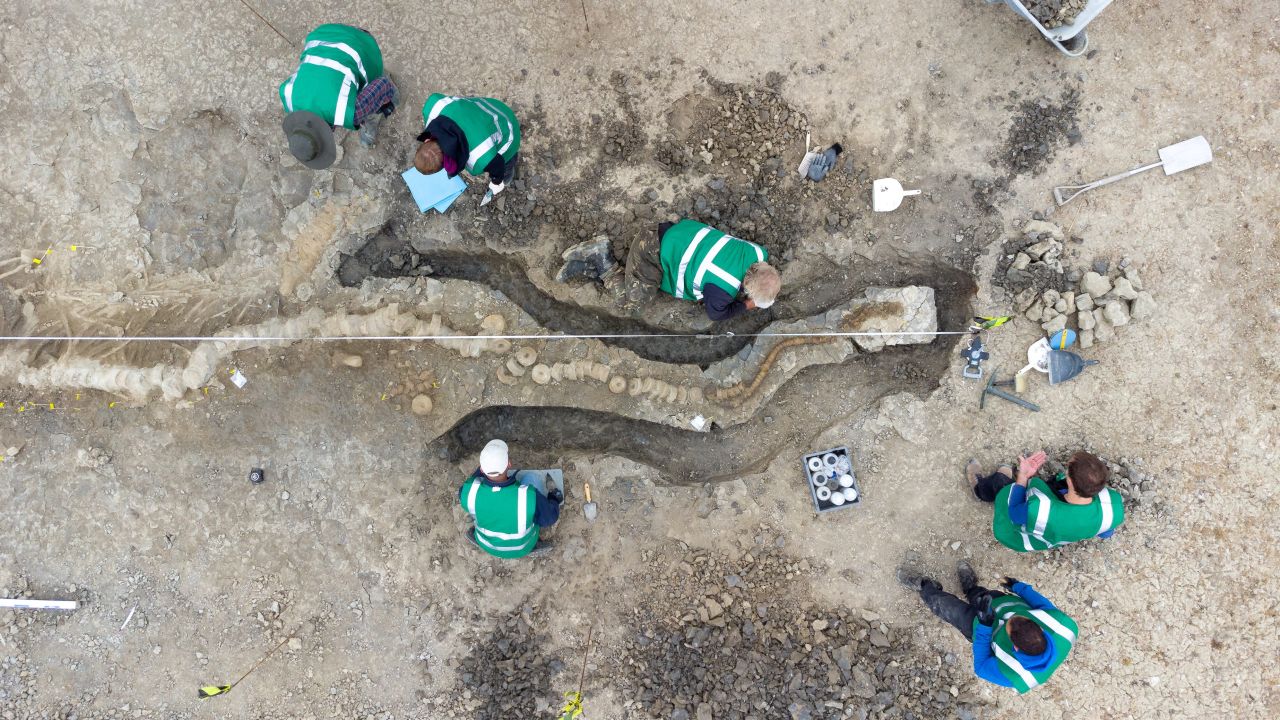Paleontologists have made a massive discovery in the United Kingdom’s smallest county — the fossilized remains of a giant Jurassic sea creature. The fossil, which researchers said is “very well-preserved,” is said to be the “palaeontological discovery of a lifetime,” according to the Leicestershire and Rutland Wildlife Trust.

The fossil was found at the Rutland Water Nature Reserve in central England in February 2021, according to an announcement from the wildlife trust. Joe Davis, who works on the water conservation team for the trust, found it during a routine draining procedure for re-landscaping.

At first, he said in a statement, he thought the remains were clay pipes sticking out of the mud, except that “they looked organic.” He told a colleague that they looked like vertebrae, and when they got closer, they saw “what indisputably looked like a spine” as well as a jawbone at the spine’s end.
“We couldn’t quite believe it,” Davis said. “The find has been absolutely fascinating and a real career highlight. It’s great to learn so much from the discovery and to think that this amazing creature was once swimming in seas above us.”
The fossil was excavated in August and September, and has since been identified as an ichthyosaur, a marine reptile that somewhat resembled dolphins. This particular fossil, found nearly complete, is nearly 33 feet long and is roughly 180 million years old, researchers said. Its skull measures at more than 6.5 feet long.
Davis told the BBC that the fossil was “very well-preserved, better than I think we could have all imagined.”
Ichthyosaur expert Dean Lomax, who helped with the fossil’s research, said that the find is the “largest ichthyosaur skeleton ever discovered in Britain.”

“These animals, they first appeared in a time called the Triassic period around roughly 250 million years ago,” Lomax said in a video for Rutland Water Nature Reserve. “Our specimen, the Rutland Ichthyosaur, or the Rutland Sea Dragon, is the biggest complete ichthyosaur ever found in Britain in over 200 years of collecting these things scientifically, which is an incredible feat.”
Ichthyosaurs are not swimming dinosaurs, he clarified.
According to company Anglian Water, which helps maintain the reservoir in which the fossil was found, ichthyosaurs of this size and completeness are “incredibly rare,” especially in the U.K., with most comparable examples being found in Germany and North America.
Alicia Kearns, who represents Rutland Melton in Parliament, said the discovery “surpassed every possible expectation.”
“It is utterly awe-inspiring,” she said.

Though the largest, this was not the first ichthyosaur fossil found in the reservoir. The Wildlife Trust said that two incomplete and “much smaller” remains were found in the ’70s when the reservoir was first being constructed.
The paleontologists working on the remains are continuing their research and are working on an academic paper about the findings.